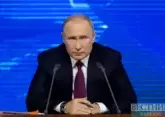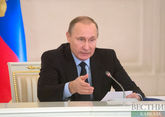A week after President Donald Trump grudgingly approved fresh US sanctions against Russia, domestic companies and foreign investors are struggling to make sense of their exact consequences — but they already see enough to fear the longer-term chilling effect on an economy starting to recover after two years of recession. The Financial Times reports in its article Russia’s recovering economy fears US sanctions chill that growth reached an annual rate of 2.5 per cent in the second quarter, the fastest in almost five years.
“This is another political move intended to poison the atmosphere of revival that has been spreading here,” said a senior executive at a Russian mining and metals group, who warned of slower growth even while insisting that the sanctions were “unenforceable and pure fantasy”.
“The recovery is definitely taking place, and the background is that the economy has adjusted to the lower oil price and the sanctions imposed in 2014,” said Chris Weafer, a senior partner at Macro Advisory, a Moscow-based consultancy. “This year and next, the new sanctions should not throw the recovery off track. But to keep going, growth needs much higher levels of inward investment, and the new sanctions regime puts that at a severe risk.”
Last year Russia received $12.9bn in foreign direct investment, making it the third-largest recipient of FDI in Europe after the UK and France, according to fDi Intelligence. Russian companies had also stepped up domestic investment, attracted by industrial policy incentives and a weak rouble that increased their competitiveness. Fixed asset investment started growing year on year in April after shrinking for more than three years. Financial investors had also started viewing Russia more favourably. By mid-2015, a year after the 2014 sanctions, “risk managers in western banks took the view that the situation had stabilised and legal risks had come down sufficiently”, said Christopher Granville, a managing director at TS Lombard, pointing to funds raised by companies including Norilsk Nickel, Metalloinvest and Evraz.

Many corporate executives were further soothed by what appeared to be the Trump administration’s friendlier approach towards companies doing business in Russia. While the Obama administration leaned on US companies to stay away from Russia’s biggest economic conference in St Petersburg and discouraged US banks from dealing in Russian government bonds, such moves stopped under Mr Trump.
That sense of comfort is now gone. The new US law tightens restrictions on lending to certain state banks and energy companies, expands energy sanctions and bars the president from relaxing sanctions without approval from Congress. It requires sanctions against those who participate in corrupt privatisation projects, and those involved in undermining cyber security.
Beyond that, the law authorises the Trump administration to impose a range of additional sanctions: against companies involved in pipeline development in Russia, and against state companies in rail, metals and mining. The US Treasury is also required to report early next year what impact it expects were it to apply sanctions to Russian government debt.
“The law has got a lot of threats hanging in the air,” said Alexis Rodzianko, president and chief executive of the American Chamber of Commerce in Moscow. “The mention of railways, for example, makes people who produce candy bars or soap powder worry that they might not be able to ship using rail.
“That creates a whole new level of uncertainty. [Business] now has to consider all these threats: how real are they, how durable is the string holding the sword of Damocles?”
US experts say one twist is that the sanctions, never favoured by Mr Trump, are not enforced by his regime — and that Congress forces his hand with further measures that Russia will find even tougher.
“This administration isn’t going to act on the authorisations or enforce existing sanctions,” said Richard Nephew, a fellow at the School of International and Public Affairs at Columbia University who worked on sanctions policy in the state department until 2015. “Therefore, I see a high likelihood of further legislation to force the administration’s hand, especially as it will be opportune for Republicans ahead of the 2018 midterm elections to demonstrate that they are tough on Russia.” He added: “My guess is that we’ll have the next sanctions bill in a year, and in that they will take all of the permission clauses from the current law and make them mandatory.” The biggest damage could be caused by broadening capital market sanctions to Russian sovereign debt — although this may be the least likely to be implemented. “Barring all foreign participation in sovereign debt would be catastrophic for [Russia], especially as foreign holdings in the Russian bond market have ballooned,” said a senior executive at a US bank.
According to the Russian Central Bank, non-residents held 30.7 per cent of total federal government debt as of June 1 — up from only 3.7 per cent in January 2012. The proportion is above 50 per cent in bonds issued last year and this year, and even higher — more than 70 per cent — in bonds with a maturity above seven years, according to Standard & Poor’s. “This is driven by the very high interest rate differential between the Russian Federation and the rest of the world,” said Karen Vartapetov, director at S&P Global Ratings.

Some analysts argue that the Russian government’s strong balance sheet and prudent fiscal policy would enable it to cope. “[It] would not be a system-crippling shock to public finance in the short to medium term,” said Mr Vartapetov. “The government’s liquid assets cover the majority of its debt and the domestic market could easily replace new external issues.”
But others disagree. “I am surprised that markets haven’t reacted more strongly,” said the US banker. “If they really sanctioned the Russian sovereign [debt], the blowback for the global financial system and the US in particular would be very significant.”
Even if this does not come true, the sanctions law is likely to weigh heavily on Russia for decades. Jackson-Vanik, an amendment to a 1974 US trade law denying the Soviet Union most favoured nation status, was not repealed until 38 years later, when it was replaced with sanctions against Russia.
“Sanctions are never reduced,” said Mr Granville. “Unless Russia becomes a client state of the US — an expectation that surfaced after the collapse of the Soviet Union but that will never come true — there will always be grievances.”










